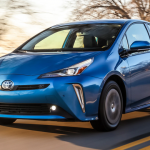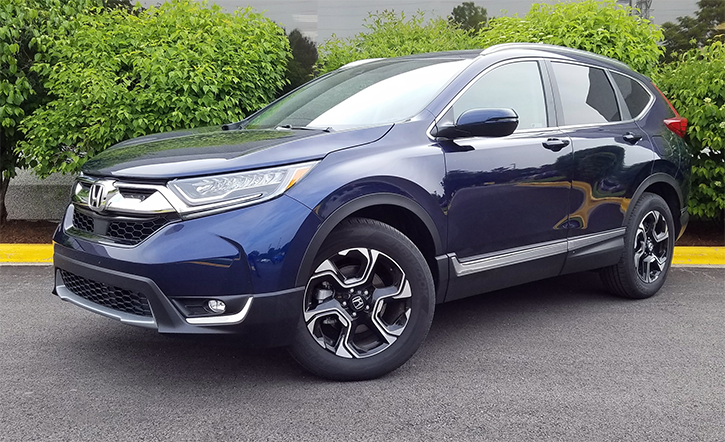
2019 Honda CR-V Touring AWD
Class: Compact Crossover
Miles driven: 515
Fuel used: 29.2 gallons
| CG Report Card | |
|---|---|
| Room and Comfort | A |
| Power and Performance | C+ |
| Fit and Finish | B+ |
| Fuel Economy | B+ |
| Value | B+ |
| Report-card grades are derived from a consensus of test-driver evaluations. All grades are versus other vehicles in the same class. Value grade is for specific trim level evaluated, and may not reflect Consumer Guide's impressions of the entire model lineup. | |
| Big & Tall Comfort | |
| Big Guy | B |
| Tall Guy | B+ |
| Big & Tall comfort ratings are for front seats only. "Big" rating based on male tester weighing approximately 350 pounds, "Tall" rating based on 6'6"-tall male tester. | |
| Drivetrain | |
| Engine Specs | 190-hp 1.5L |
| Engine Type | 4-cylinder turbo |
| Transmission | CVT automatic |
| Drive Wheels | AWD |
Real-world fuel economy: 26.7 mpg
Driving mix: 50% city, 50% highway
EPA-estimated fuel economy: 27/33/29 (city/highway combined)
Fuel type: Regular Gas
Base price: $32,850 (not including $1095 destination charge)
Options on test car: None
Price as tested: $33,945
Quick Hits
The great: Plenty of passenger and cargo space, obvious build quality
The good: Ride quality, fuel economy, cabin quietness at speed
The not so good: Middling power from 1.5-liter turbocharged engine, limited option and trim-level availability
More CR-V price and availability information
CG Says:
We will guess that when Honda looks at the CR-V, it sees something that “ain’t broke” because the automaker isn’t “fixing” its compact crossover SUV. In its current form since the 2017 redesign that ushered in improvements to passenger and cargo space, some new features, and general refinement, about all the 2019 version does is make Honda Sensing safety technologies standard on all models except the base LX.
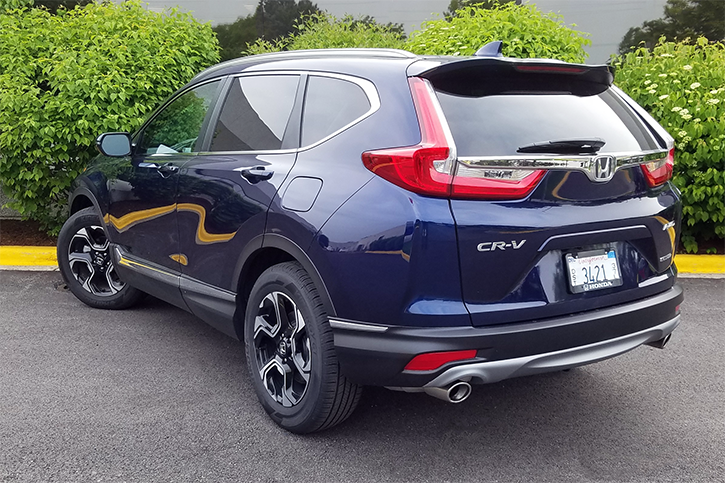
Not that there’s anything really wrong with that. In 2017 Consumer Guide declared itself OK (but only just OK) with the 190-hp turbocharged 1.5-liter four-cylinder engine and CVT automatic transmission used in the higher-end CR-V models. That’s the same powerteam that was in the 2019 Touring tested by CG. But with that come the commendable cargo space, back-seat room, ride comfort, and quality fit and finish in the cabin for which we give it high marks.
Test Drive: 2019 Toyota RAV4 Limited
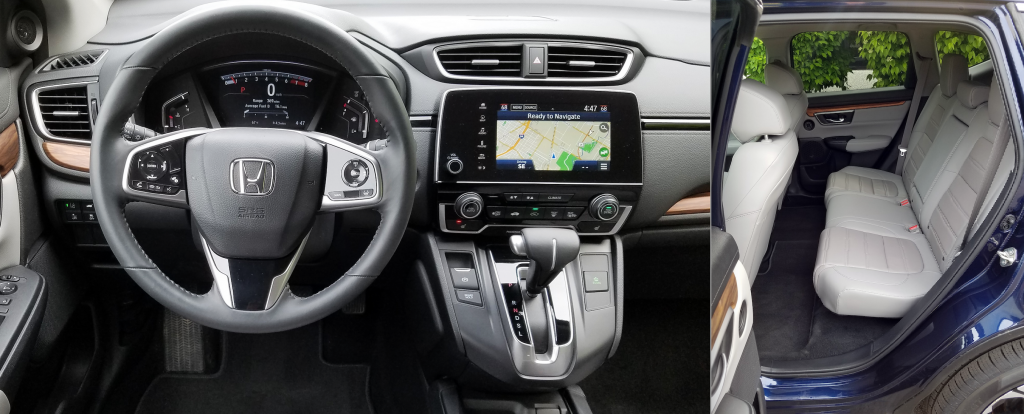
The 2019 Touring with all-wheel drive, which is what we drove, starts at $35,145, or $1400 more than a front-drive CR-V Touring costs. In addition to the turbo engine and Honda Sensing (a suite of forward-collision warning and mitigation, pedestrian detection, road-departure mitigation, lane-departure warning, adaptive cruise control, and low-speed follow and lane-keep assist), the top-of-the-line CR-V also lists 18-inch alloy wheels, power moonroof, hands-free power liftgate, LED headlights with automatic high-beam control, fog lights, and rain-sensing windshield wipers. The interior displays leather upholstery, heated power-adjustable front seats, a leather-wrapped steering wheel, auto-dimming rearview mirror, dual-zone automatic climate control, and a premium 9-speaker audio system. Tech and convenience features include navigation, Apple CarPlay/Android Auto connectivity, HondaLink telematics, keyless entry and starting, remote engine start, rear cross-traffic alert, blind-spot alert, and a driver-attention monitor.
Quick Spin: 2019 Nissan Rogue SL
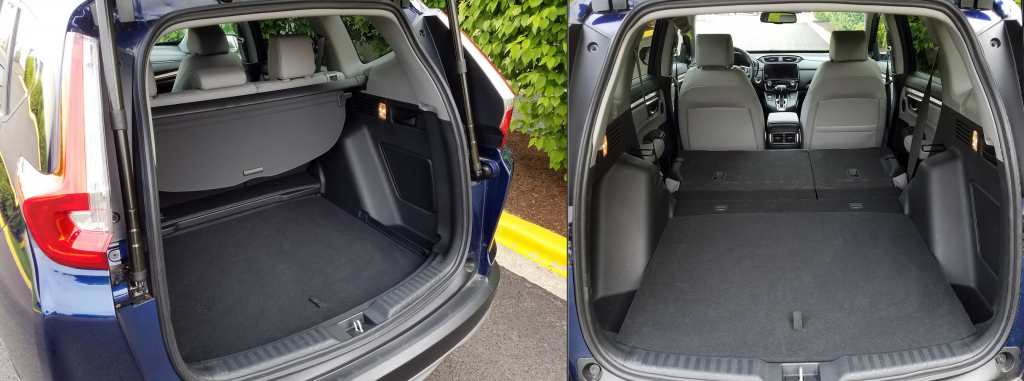
What the CR-V lacks in driving verve it more than makes up for in day-in-day-out usefulness. There’s very good legroom and headroom for the class. You may not get three adults across the back seat, but three teens certainly will fit. A flat floor helps out there. Entries and exits are easy through all four doors, and drivers will encounter good sightlines to just about any direction. Controls are laid out well and are easy to understand and operate.
Should I Buy a Car or Crossover?
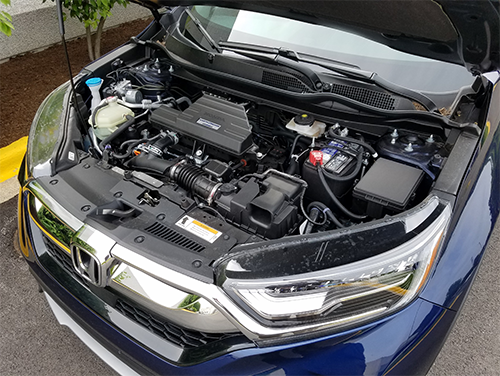
Personal-item storage in the cabin benefits from a sizeable glove box, and a partially open console box with a lift-up armrest and adjustable/removable organizer tray that helps configure the space. Within the console box are dual USB ports and a 12-volt outlet. The console has two additional exposed bins and twin cup holders. Rear passengers are presented with a pouch on the back of the front passenger seat, and cup holders in the pull-down center armrest. There are pockets in all four doors. Second-row seats that fold flat enhance the vehicle’s cargo-hauling capability.
The competent but not thrilling engine sounds off some when leaned on, and the continuously variable transmission doesn’t make either of those shortcomings any better. The EPA says the 1.5-liter engine in an AWD CR-V should average 27 mpg in city driving, 33 mpg in highway operation, and 29 combined. However, in CG’s hands, the test vehicle only neared the city number (at 26.7 mpg) with just 60 percent of miles driven under city-type conditions. We continue to find the CR-V fairly nimble, with generally pleasant handling and nicely weighted steering. It keeps its composure over most bumps and pavement irregularities.
In the realm of small sport-utilities, the CR-V seems to be more of a head than a heart choice. We think you’ll be more likely to gravitate to it if a need for practical transportation motivates you more than a desire for a spirited driving experience.
Test Drive: 2019 Mazda CX-5 Signature
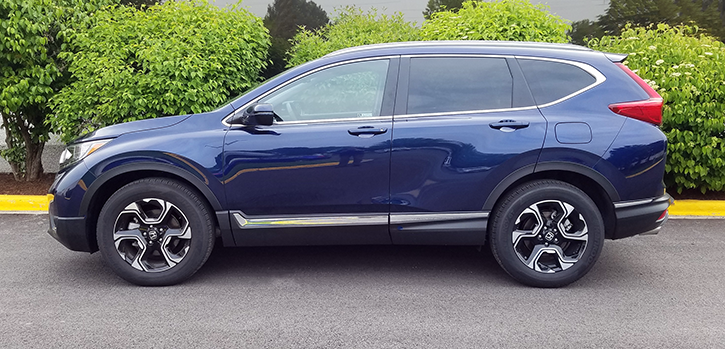
Test Drive: 2019 Subaru Forester Touring
2019 Honda CR-V Touring


